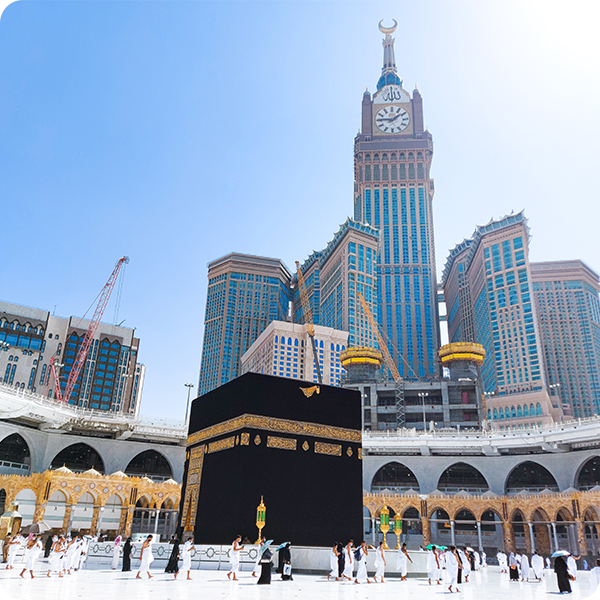The intention should be to sincerely fulfill Allah’s command, not for status, pride, or tourism. A pure niyyah earns the reward of an accepted Hajj free from sin and full of mercy

What is Hajj?
Hajj is the annual pilgrimage to Makkah, required once in a lifetime for all financially and physically able Muslims. It commemorates the legacy of Prophet Ibrahim (AS) and takes place during Dhul Hijjah, the final month of the Islamic calendar.
“And proclaim to the people the Hajj…” – Surah Al-Hajj (22:27)

Hajj 2026 Dates
Anticipated from May 24 ,2026 to May 29 ,2026, depending on moon sighting. The primary rituals will take place from 8th to 13th Dhul Hijjah.
Step-by-Step Hajj Guide
-
Ihram: Entering the sacred state with intention
-
Tawaf: Circling the Kaaba
-
Sa’i: Walking between Safa and Marwah
-
Arafah: Standing at Arafat, the day of forgiveness
-
Muzdalifah: Spending the night under the open sky
-
Ramy: Throwing pebbles at the symbolic pillars
-
Qurbani: Offering the sacrificial animal
-
Tawaf al-Ifadah & Wada: Completing the final rituals
With Alkhidmat, you can fulfill your Qurbani donation, helping ensure that fresh meat reaches vulnerable families in Pakistan and Palestine
Spiritual Impact
Hajj purifies the soul, renews faith, and unites the Ummah
“Whoever performs Hajj, returns like a newborn.” (Bukhari)
Prepare for Hajj 2026
● Attend pre-Hajj workshops
● Understand Travel guidelines
● Learn key duas and rulings
● Pack essential items with car
Give Back This Dhul Hijjah
Not traveling? You can still earn reward:
● Donate Qurbani through Alkhidmat
● Give a Prophetic Qurbani
Act Now, Earn Forever – This Dhul Hijjah
The first ten days of Dhul Hijjah are among the most sacred days in the Islamic calendar. These days hold immense spiritual value, and any good deed performed during this time is greatly multiplied in reward. It's a time to reflect, reconnect with your faith, and extend your hand to those in need. Giving back during these blessed days not only helps others but also brings you closer to Allah.
Here’s how you can make the most of these 10 days:
-
Give Charity: Support causes that matter to you and help those who are struggling.
-
Increase Worship: Perform extra prayers, recite the Qur’an, and make constant dhikr.
-
Fast the First Nine Days: Especially on the Day of Arafah, which carries great reward.
-
Help the Needy: Provide food, clothing, or support to those in need around you.
-
Make Dua: Use this sacred time to ask Allah for forgiveness, guidance, and blessings.
Make every moment count and let your actions reflect the true spirit of Dhul Hijjah.
Eid-ul-Adha & Qurban
Eid-ul-Adha, also known as Eid e Qurban, begins after the main rites of Hajj on the 10th of Dhul Hijjah. It honors the unwavering obedience of Prophet Ibrahim (AS), who was willing to sacrifice his son for the sake of Allah
This day is celebrated by Muslims worldwide through acts of worship, charity, and Qurbani (sacrifice of an animal), which symbolizes submission to Allah’s will and compassion for the poor.
Stay Updated
Join our newsletter for Hajj updates and donation appeals.
Hajj 2026 Resources
Yes, among many, the following dua is powerful:ُ
هَّم الل َتَقَّب ْل َح ِّجي ُه َّ َوا ْجَعل َمْب ُرو ًرا ي ْ ِ َم ي ْش ُك َو َس ْعي و ًرا ِ ب نْ َوذ و ًرا َ َمْغفُ
“O Allah, accept my Hajj, make it righteous, my effort appreciated, and my sins forgiven.”
No. Hajj performed using unlawful (haram) wealth is not accepted. The Prophetصلى الله عليه وسلمsaid:
“Indeed, Allah is pure and only accepts what is pure.”
It’s vital to ensure Hajj is funded through halal means
Yes. A Hajj Mabroor is one that is accepted by Allah, marked by good behavior, sincerity, and no sinful activity. Its reward is nothing less than Paradise (Sahih Bukhari).
While only Allah knows, signs of an accepted Hajj include:
● A noticeable change in the person’s behavior and sincerity.
● Avoidance of sin post-Hajj.
● Increased humility, prayer, and generosity.
● Detachment from materialism and worldly desires.
Hajj tests physical and emotional limits through crowds, heat, fatigue, and discomfort reminding the pilgrim of life’s temporary nature and cultivating sabr (patience), humility, and reliance on Allah.
It is preferred to clear debts before performing Hajj. However, if the creditor permits, or if arrangements have been made to repay, the person may go. Islam emphasizes fulfilling rights before optional acts.
● Increase prayer, Quran recitation, and dhikr.
● Seek forgiveness from others.
● Repent sincerely to Allah.
● Learn about the Prophet’s way of performing Hajj.
● Make peace with family and settle debts or disputes.
While it is permissible, scholars recommend allowing others the chance to perform this obligation especially if quotas and waiting lists are in place.


